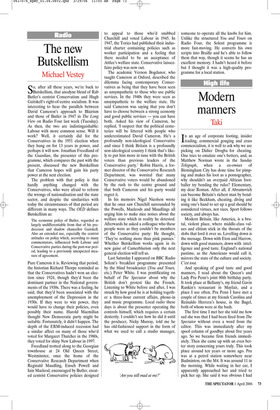The new Butskellism
Michael Vestey
So, after all these years, we’re back to Butskellism, that anodyne blend of Rab Butler’s centrist Conservatism and Hugh Gaitskell’s right-of-centre socialism. It was interesting to hear the parallels between David Cameron’s approach to Blairism and those of Butler in 1947 in The Long View on Radio Four last week (Tuesday). As then, the two are indistinguishable: Labour with more common sense. Will it work? Well, it certainly did for the Conservatives in the 1951 election when they hung on for 13 years in power, and perhaps it will now. Jonathan Freedland of the Guardian, the presenter of this programme, which compares the past with the present, discussed the new Butskellism that Cameron hopes will gain his party power at the next election.
The problem with that policy is that hardly anything changed with the Conservatives, who were afraid to reform the wrongs of nationalisation and the state sector, and despite the similarities with today the circumstances of that period are different in many ways. The OED defines Butskellism as:
The economic policy of Butler, regarded as largely undifferentiable from that of his predecessor and shadow chancellor Gaitskell. Also an extended use, especially the centrist attitudes on policy which, according to many commentators, influenced both Labour and Conservative parties during the post-war period, leading to a previously unexpected measure of agreement.
Pure Cameron it is. Reviewing that period, the historian Richard Thorpe reminded us that the Conservatives hadn’t won an election since 1924, though they’d been the dominant partner in the National governments of the 1930s. There was a feeling, he said, that they’d been associated with the unemployment of the Depression in the 1930s. If they were to win power, they would have to change their policies, even possibly their name. Harold Macmillan thought New Democratic party might be suitable. Fortunately, it didn’t happen. The depth of the ERM-induced recession had a similar affect on many of those who’d voted for Margaret Thatcher in the 1980s, they voted for shiny New Labour in 1997.
Freedland trotted along to the Georgian townhouse at 24 Old Queen Street, Westminster, once the home of the Conservative Research Department when Reginald Maudling, Enoch Powell and Iain Macleod, encouraged by Butler, created centrist Conservative policies designed to appeal to those who’d snubbed Churchill and voted Labour in 1945. In 1947, the Tories had published their industrial charter containing policies such as worker participation and a feeling that there needed to be an acceptance of Attlee’s welfare state. Conservative laissezfaire policy was now out.
The academic Vernon Bogdanor, who taught Cameron at Oxford, described the dilemma facing contemporary Conservatives as being that they have been seen as unsympathetic to those who use public services. In the 1940s they were seen as unsympathetic to the welfare state. He said Cameron was saying that you don’t have to choose between a strong economy and good public services — you can have both. Asked his view of Cameron, he replied, ‘I suspect that the political cemeteries will be littered with people who underestimated David Cameron. He’s a profoundly non-ideological Conservative and since I think Britain is a profoundly non-ideological country I think that’s likely to put him more in tune with the British voters than previous leaders of the Conservative party.’ Robin Harris, a former director of the Conservative Research Department, was worried that many Conservative voters would be abandoned by the rush to the centre ground and that both Cameron and his party would regret it.
In his memoirs Nigel Nicolson wrote that he once saw Churchill surrounded by the Powells, Macleods and Maudlings all urging him to make nice noises about the welfare state which in reality he detested. Afterwards he asked a colleague who these people were as they couldn’t be members of the Conservative party: He thought, ‘They’re nothing more than pink pansies.’ Whether Butskellism works again in its new guise of Camerblurism only the next general election will tell us.
Last Saturday I appeared on BBC Radio Solent’s breakfast programme presented by the blind broadcaster (You and Yours, etc.) Peter White. I was pontificating on behalf of The Spectator about why the British don’t protest like the French. Listening to White before and after, I was struck by how good he is at holding together a three-hour current affairs, phone-in and music programme. Local radio these days is about the presenter operating the controls himself, which requires a certain dexterity. I couldn’t see how he did it until the producer, Nicky Murray, told me he has old-fashioned support in the form of what we used to call a studio manager, someone to operate all the knobs for him. Unlike the structured You and Yours on Radio Four, the Solent programme is more fast-moving. He converts his own scripts into Braille and he’s able to follow them that way, though it seems he has an excellent memory. I hadn’t heard it before but I thought it was a high-quality programme for a local station.


























































































 Previous page
Previous page